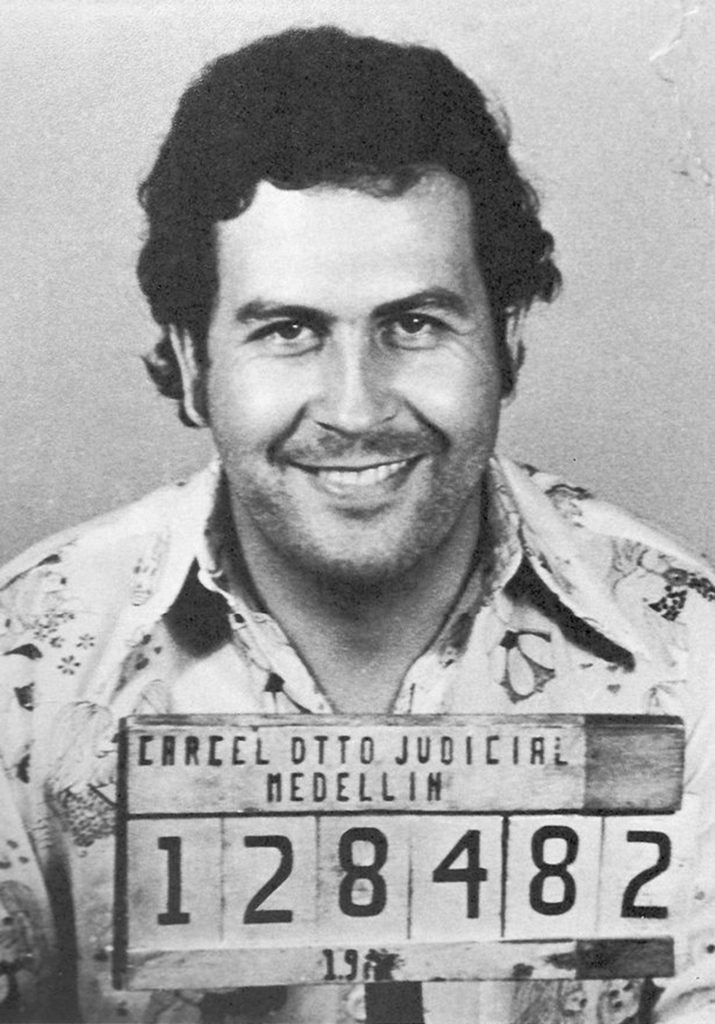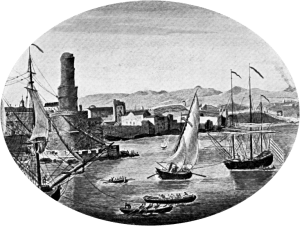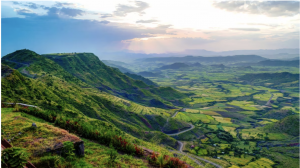
Pablo Emilio Escobar Gaviria was one of the most notorious villains of all time and is known as “The world’s greatest outlaw.” Escobar was born on December 1, 1949 in Rionegro, a small village close to Medellín, Columbia. He came from an extremely poor family; he and his brother Roberto were once sent home from school as they could not afford to buy any shoes. He briefly studied at Universidad Autónoma Latinoamericana but was forced to leave as he was unable to pay the fees required. This was the point when his criminal career began. He and his brother allegedly stole gravestones and sanded them down to be resold. He then moved into other crimes, such as street scams and stealing cars.
In the 1970s, Escobar was introduced to smuggling by Alvaro Prieto, who was a local smuggler with many connections. Escobar then began to distribute powder cocaine himself, meaning he would make more money for himself. Escobar also established the first smuggling routes into the United States in 1975. His infiltration into the drug market of the U.S. expanded exponentially due to the rising demand for cocaine in the U.S. By the 1980s, it was estimated that 70 to 80 tons of cocaine were being shipped from Colombia to the U.S. monthly. His rise continued when infamous Medellín drug dealer Fabio Restrepo was murdered and all his workers were told that they now worked for Escobar, making him the head of the Medellín Cartel, one of the largest drug cartels in history. As the demand for cocaine in the US grew, so did Escobar’s empire. Escobar and his brother were soon organizing distribution networks through Panama, Bahama, and South Florida, among other areas in the U.S.1

At the height of his criminal career, Escobar and his cartel controlled over 80 percent of the global cocaine market. Escobar was the wealthiest criminal in history, with an estimated known net worth of US $30 billion by the early 1990s (equivalent to about $55 billion as of 2016). During the height of its operations, the Medellín Cartel made more than 70 million U.S. dollars per day (roughly $26 billion in a year), smuggling 15 tons of cocaine per day, with a street value of over half a billion dollars, into the United States. The cartel spent over $1000 per week purchasing rubber bands just to hold stacks of cash together to store in their warehouses. Ten percent of this cash had to be written off each year because it would be eaten by rats.1
During his early life, Escobar learnt that police were open to bribes, but as he became more powerful, he developed his own policy: ‘plata o ploma,’ simply meaning ‘silver or lead.’ This policy led to the death of hundreds of policemen and state officials, which solidified Escobar’s reputation as a cold ruthless killer as well as a drug lord. Escobar apparently said, “better a grave in Columbia than a gringo jail.” Being extradited to the U.S. was his biggest fear. After multiple failed attempts to capture Escobar, the government offered a $400,000 reward for whoever killed him. This resulted in Escobar declaring war on the Columbian government. His wealth was enough to start this war, as he offered a reward to anyone who murdered a police officer. Over 600 officers were killed, making Columbia the murder capital of the world in 1991 and 1992.1
However, there is another side of Pablo Escobar that we often fail to hear about, as it is clouded by all the bad things he did. He was always willing to give back to the people of Columbia. Many people in Columbia still believe that Escobar did a lot more to better the lives of the poor and less privileged than the Colombian government ever did. Many poor people in Columbia felt neglected by the government, whereas when Escobar was alive they had someone to help them. Coming from a background of poverty himself, he knew how tough life was for the poor, and always shared his money and wealth with the community. Escobar made sure everyone in his community was taken care of. He provided work and shelter for those who needed jobs or residences. Even to this day, Escobar is referred to as “The Godfather” or “Robin Hood” by his people because of the invaluable contributions he made for the society. For example, he constructed numerous housing projects so that everyone at least had a place to live. He is also responsible for establishing and funding soccer teams and leagues in Colombia as well as building countless numbers of churches, hospitals, and schools across the country. He advocated education for the children.4
There are two completely different sides to the story of Pablo Escobar. Most people know the story of a ruthless, atrocious criminal that ruined and took the lives of countless numbers of innocent victims. On the other hand, by some, especially the working class in Columbia, he is thought of as a very respectable human being who made irreplaceable contributions and gave back freely to the community genuinely out of his good will to better the lives of the poor and less fortunate. A large amount of the working and lower class of Columbia are grateful to Escobar because of all the things he did for them. Escobar came from nothing and made something out of his life, and although what he did was illegal, he used a large portion of his proceeds towards good causes. Escobar wanted to make Columbia better and improve the quality of life for the people. Although he achieved this through criminal activity, he did achieve his goals. During the era of Escobar, Columbia’s quality of life was on the rise.5
However, the good things Escobar did do not make up for all the innocent lives that he ended. Some people think that the Columbian government is partially to blame for the deaths of the officers by putting so many on the front line to try to capture him. Escobar was so powerful that he had so many people willing to fight against the officers for him that many of the officers had no chance in a firefight against the cartel. It is a matter of opinion as to how people see Pablo Escobar. Most people see him as a major criminal; however, many people in Columbia still believe that Escobar used his wealth for good intentions.
- Global Events: Milestone Events Throughout History, 2014, s.v. “Pablo Escobar Dominates the International Cocaine Trade,” by Jennifer Stock. ↵
- Global Events: Milestone Events Throughout History, 2014, s.v. “Pablo Escobar Dominates the International Cocaine Trade,” by Jennifer Stock. ↵
- Global Events: Milestone Events Throughout History, 2014, s.v. “Pablo Escobar Dominates the International Cocaine Trade,” by Jennifer Stock. ↵
- Ron Chepesiuk, Escobar Versus Cali: The War of the Cartels (South Carolina: Rock Hill, 2013), 48-50. ↵
- Aldona Bialowas Pobutsky, “Peddling Pablo: Escobar’s Cultural Renaissance,” Hispania Vol. 96, No. 4 (December 2013): 684-699. ↵



70 comments
Engelbert Madrid
People’s viewpoints towards Pablo Escobar can be different due to the experience and feeling towards his criminal behavior and actions. On the other hand, some people might see Escobar as a hero that was willing to help the working class economically in Colombia. Therefore, the poor class in Colombia honored him for his immense amount of support in their communities. However, it is argued by many people that Escobar probably did good things to the poor class in Colombia to get their vote and pleasure for his presidency campaign.
Cooper Dubrule
Pablo Escobar has very questionable morals undoubtedly and many continue to argue that his intentions were better than portrayed and so on. In my opinion the fact that he was selling drugs that were detrimental to the public health really makes him a negative figure. I do however agree that he had a degree of “good” in him, especially in giving back to the working class through his drug empire.
Gabriela Ochoa
I know some about Escobar what what he did for Columbia and its people besides all of the bad things he did. I agree that the things he did were not right and that selling drugs to people and having others killed mainly police officers isn’t good but the things he did that were good helped a lot. My dad like Escobar grew up poor and made his life better and tried to make others lives better but in a good way. So I understand him trying to make his life and the other people’s lives better but he should have done it in a better way.
Luis Magana
I grew up in cuidad Juarez where El Chapo a famous drug king was under arrest. Even as bad as El Chapo was Pablo Escobar has been the drug king who has always caught my attention the most. He built schools, hospitals and gave money to the poor but you cannot forget that he killed so many people and sold drugs. I watched the series Narcos and I remember in an episode he was about to be caught by the DEA and he was moving from house to house and one night his daughter was cold and he burned about 3 million dollars to keep her warm. He was filthy rich but for the wrong reasons it was dirty money. He even tried to become president to have complete power and control. This was amazing article that brought back many memories about stories of drug kings I’ve heard of and seen.
Eric Ortega Rodriguez
This is a very fascinating article. For the most part, when I think about Emilio Escobar Gaviria, I usually think of the stigma which surrounds his name. However, this article provides a different point of view and one which I have never heard of before. I have only heard of the illegal actions done by Escobar, never about the actions he did to benefit and help Columbia. It is interesting to see that although many viewed him as a villain. He was only trying to look out for himself and Columbia. Whether one views him as a positive or negative person, is completely up to the individual. Overall, great topic choice and article!
Honoka Sasahara
It is extremely terrible that Escobar tempted his people to kill police officers. His other crimes were so frightening that I could’t help but think that he was “The world’s greatest outlaw” itself. However, it is also truth that he did many good things to those who were poor. In my opinion, his hard experiences when he was a poor child led his life to the wrong way although he originally had a pure heart.
Kathyleen Lauriano
Many people seem to think that Pablo Escobar was horrible person. But his intentions were good. He knew what it felt like to not have much and be hopeless. Yeah it seemed like he wanted power but it wasn’t that. I don’t agree to how he did things but I truly believe He wanted to help others. To help his family and give them anything and everything they wanted. So they could have a better life than he did.
Nathalie Herrera
It is interesting to read about the two sides of Pablo Escobar. Although he was known for killing hundreds of police officers and smuggling illegal drugs, Escobar was also known as “The Godfather” or “Robin Hood” to many people in Colombia. He made sure to take care of everyone because he knew first hand how poverty felt within Colombia. Although Escobar is known as a criminal he is also seen as a savior, he did both good and bad within his country.
Jocelyn Moreno
Pablo Escobar helped others because he knew how it felt to be poor and helpless. He used his illegal earnings to help his community prosper. It’s crazy how he went from stealing cars to trafficking drugs. Although it seemed as if power was what he wanted, I believe he just wanted his family to have a great life; he loved his family more than everything. It’s crazy to believe that that was such a normal life for them. I loved how you organized the article and gave details about his life before his “fame”. Really well put together !
Sebastian Carnero
At least, in my opinion, he was a shameless criminal. Yes, Escobar built schools and hospitals, but while selling drugs. He helped poor people in many occasions but ruined the lives of many by selling tons of drugs every day and assassinating his enemies and innocents that were between. The means in which you help are extremely important. I doubt the only reason he sought money was to help the working class. What if he helped people to buy their support and approval? That makes more sense to me, he even tried to become president. Nonetheless, this article had an interesting point of view.